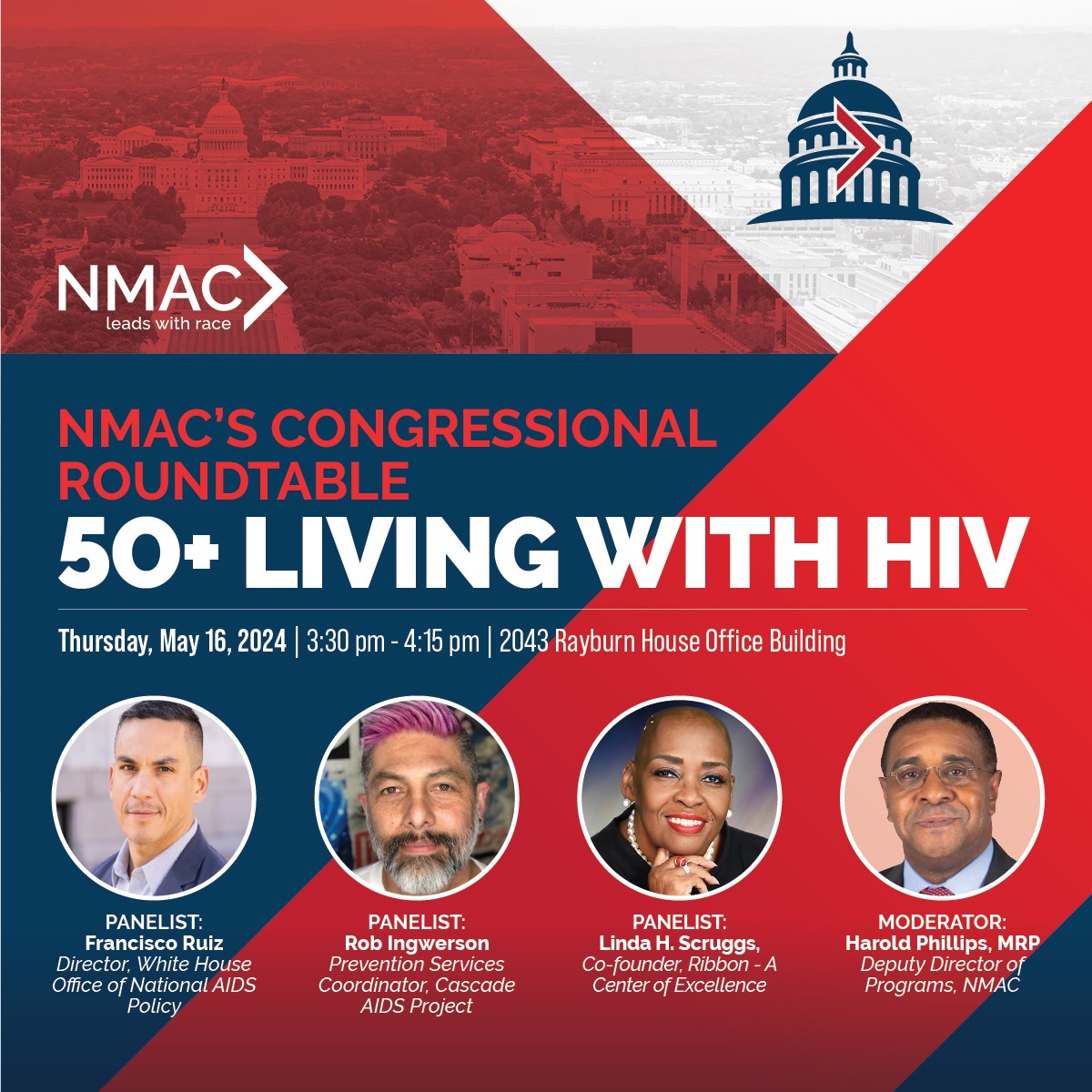The Big Picture – Representing and Aging with HIV
According to the Centers for Disease Control (CDC), out of the nearly 1.2 million people living with HIV in the United States, over half are over the age of 50. While therapeutic advancements in HIV treatment have significantly improved the lives of individuals over 50 with HIV, it’s imperative to ensure their continued protection and support as they navigate the challenges of aging.
With its Over 50 Group, NMAC emphasizes the urgent need to prioritize the well-being of our aging population living with HIV. Addressing the persistent health challenges confronting individuals over 50 living with HIV requires a nuanced understanding of their unique circumstances. This demographic often grapples with managing multiple chronic conditions as well as mental and behavioral health issues while navigating healthcare systems that may not adequately cater to their needs. These obstacles significantly impact their quality of life and overall wellness.
NMAC’s Policy Efforts – Advocating and Building Relationships
As we acknowledge the growing population of individuals over 50 living with HIV, NMAC reaffirms its commitment to advocating for comprehensive clinical and support services and tailored healthcare solutions that empower this community to thrive. By fostering collaboration and promoting policies that prioritize their well-being, we can collectively work towards a future where all individuals, regardless of age, receive the care and support they deserve.
Congresswoman Suzanne Bonamici’s steadfast commitment to seniors living with HIV serves as a beacon of advocacy and inclusivity. NMAC is deeply honored by her invitation for us to provide written testimony for her member roundtable addressing the reauthorization of the Older Americans Act this year. During this pivotal discussion, NMAC’s Director of Treatment, Moisés Agosto-Rosario, provided valuable testimony into the unique challenges encountered by individuals over 50 living with HIV (see below).
In collaboration with Congresswoman Bonamici, NMAC played an integral role in crafting the Report Language for the FY 2025 Labor-Health and Human Services appropriations subcommittee. Recognizing the importance of garnering widespread support, Congresswoman Bonamici agreed to open the Dear Colleague letter at NMAC’s request, inviting fellow members to add their signatures in solidarity. We urge you to reach out to your respective member of Congress and encourage their support by signing onto this vital initiative.
As we commemorate Older Americans Month (May), NMAC is honored to partner with Congresswoman Bonamici for an upcoming Congressional roundtable. This event aims to raise awareness of the myriad health challenges faced by individuals over 50 living with HIV, fostering dialogue and advocating for meaningful change.
We are pleased to share both Moisés’ compelling testimony and Congresswoman Bonamici’s Dear Colleague letter (below).

NMAC’S Congressional Roundtable
Date: Thursday, May 16, 2024
Time: 3:30 pm – 4:15 pm
Location: Room 2043, Rayburn House Office Building, Capitol Hill, Washington D.C.
Congresswoman Suzanne Bonamici’s Dear Colleague Letter
Dear Chairman Aderholt and Ranking Member DeLauro:
We respectfully request inclusion of the below report language to improve the lives of seniors living with human immunodeficiency virus (HIV) in the FY2025 Labor, Health and Human Services, Education, and Related Agencies appropriations legislation.
In 2021, more than half of the people in the United States diagnosed with HIV were aged 50 and older. As adults age and live with HIV, they face greater risk of damage to the immune system and long-term complications. The Older Americans Act (OAA) is a cornerstone of our nation’s commitment to seniors. Older adults living with HIV would greatly benefit from services under OAA to decrease isolation, improve health outcomes, and increase access to culturally competent services and supports. They are our neighbors, friends, and family members, and they should live and age with dignity.
We look forward to continuing to work with you to make sure all seniors receive needed elder care support and services.
Sincerely,
Suzanne Bonamici, Member of Congress
Testimony, Moisés Agosto-Rosario, Director of Treatment, NMAC

Read Moisés Agosto-Rosario’s full testimony on the critical issue of including HIV/AIDS considerations in the reauthorization of the Older Americans Act (OAA) here.
“The Older Americans Act has long been a cornerstone of support for older adults across our nation. However, as Congress considers its reauthorization, it is imperative that we recognize and address the unique challenges faced by older adults living with HIV/AIDS. This population represents a growing demographic within our aging population, yet they often face heightened barriers to accessing essential services and support.”
Moisés Agosto-Rosario has lived with HIV for the past 37 years. He is the Director of Treatment for NMAC and the HIV 50+ Strong and Healthy Program. He has done domestic and global work on HIV treatment preparedness, treatment education, and community grant-making with the Tides Foundation, The International Treatment Preparedness Coalition (ITPC), and NMAC. He worked at the People with AIDS Coalition of New York as the Editor of the SIDAAhora magazine and was a member of ACT UP NY.

